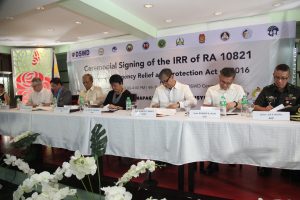PH gov’t agencies sign first, only law in the world prioritizing protection of children during disasters
Disaster, News March 1, 2017, 0 Comment 0
Photo caption (middle, left to right): Department of Social Welfare and Development (DSWD) Secretary Judy M. Taguiwalo signs the Implementing Rules and Regulations (IRR) of the Children’s Emergency Relief and Protection Act with Save the Children Country Director Ned Olney, Department of Health (DOH) Undersecretary Gerardo Bayugo, Department of National Defense (DND) Secretary Delfin Lorenzana, Department of Education (DepEd) Undersecretary Alberto Muyot, Office of Civil Defense (OCD) administrator Undersecretary Ricardo Jalad, and Armed Forces of the Philippines-Human Rights Office (AFP-HRO) chief B/Gen. Jose Antonio Carlos Motril.
Department of Social Welfare and Development (DSWD) Secretary Judy M. Taguiwalo and Department of National Defense (DND) Secretary Delfin Lorenzana led yesterday the signing of the Implementing Rules and Regulations (IRR) of Republic Act (RA) No. 10821 or the ‘Children’s Emergency Relief and Protection Act’ – a law considered as the first and only in the world that protects children during emergencies and disaster situations.
“This is a very important law as it will contribute to our efforts to further protect those who are most vulnerable during disasters,” explained Sec. Taguiwalo in her opening remarks.
Apart from the importance of the law, Sec. Taguiwalo also discussed several salient points in the law such as the establishment of a Comprehensive Emergency Program for Children (CEPC) which is designed to protect and support the immediate recovery of children and pregnant and lactating mothers during and after emergencies and disaster situations.
The signing was witnessed by students from San Vicente Elementary School who also showcased their talents by playing musical instruments at the event.
Also present in the ceremonial signing were OCD administrator Undersecretary Ricardo Jalad, Department of Education (DepEd) Undersecretary Alberto Muyot, Department of Health (DOH) Undersecretary Gerardo Bayugo, AFP-Human Rights Office (HRO) chief B/Gen. Jose Antonio Carlos Motril, Save the Children Country Director Ned Olney and UNICEF Philippines Representative Lotta Sylwander.
Lastly, Sec. Taguiwalo said that, “As we push for the implementation of the law at all levels, we hope to make the public recognize the truth that disaster risk reduction, response and management processes involve the collective action between the public and the government.”
“The key ways to ensure the proper enactment of this law is to empower the public and encourage their involvement in crafting and implementing policies and programs that can help improve the ability of Filipino communities to mitigate the effects of calamities and disasters, and promote resiliency,” she ended. ###